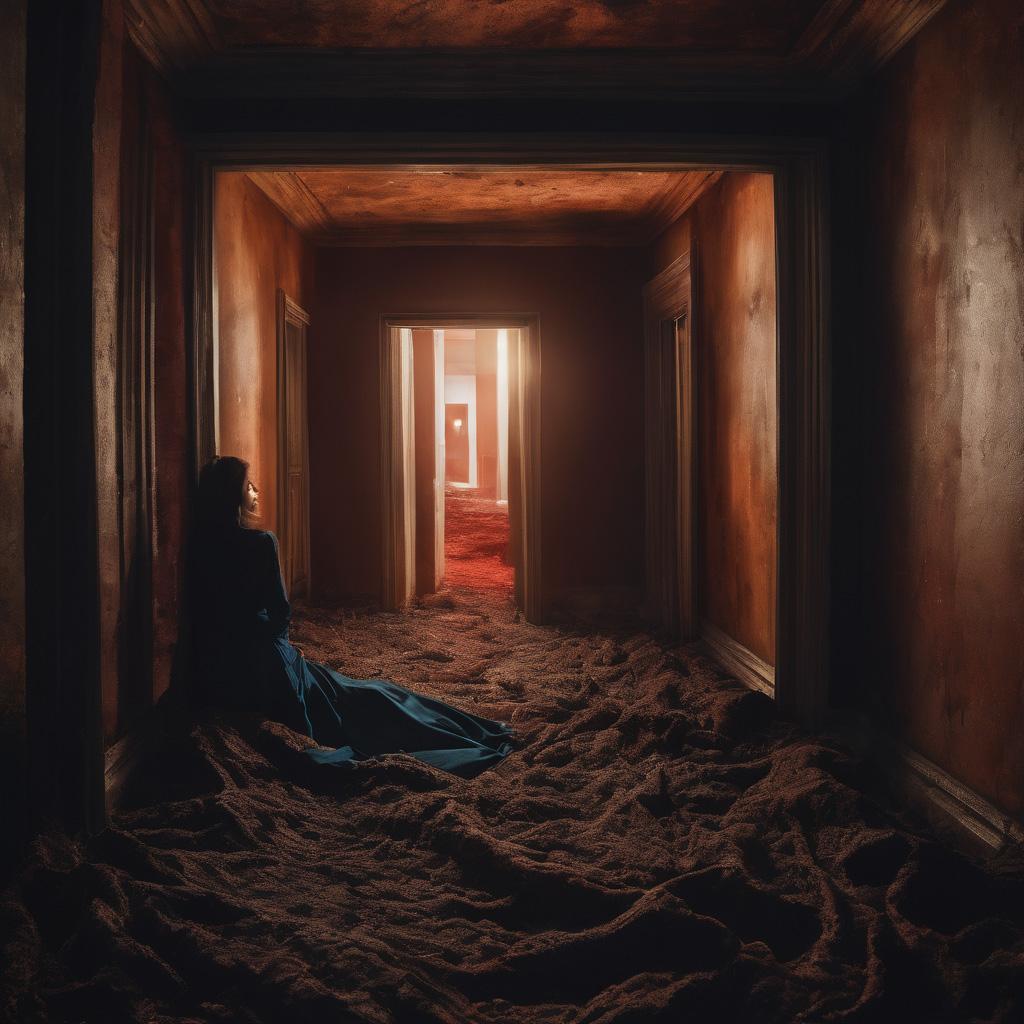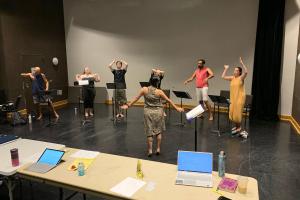Auditions for "The Duchess of Malfi" are January 17

Auditions for The Duchess of Malfi will be held on Wednesday, January 17 from 6 to 9 p.m. in room 399 in the Performing Arts Center. Please come prepared with two contrasting monologues in verse or heightened language (think Shakespeare, Marlowe, Greek tragedy, etc). Total audition time should not exceed 3 minutes.
Callbacks will be held Sunday, January 21 from 10 a.m. to 2 p.m. in room 399 in the Performing Arts Center. Those who are called back will be sent sides to prepare. Please come prepared, having made choices about character intent and tactics in the sides.
The deadline to sign up for auditions is 5 p.m., Monday, January 15.
About The Duchess of Malfi
- A new take on a Jacobean revenge tragedy by John Webster
- Director: Christina Gutierrez-Dennehy
- Period movement/gesture coach: Judd Farris
The Duchess of Malfi is a 1612 revenge tragedy, and one of the only such plays from the period that centers on the plight of a female main character. The play begins as the recently widowed Duchess falls in love with her servant Antonio. Her brothers—Ferdinand and the nameless but very corrupt Cardinal—forbid her to remarry because they want to secure the family fortune for themselves. The Duchess and Antonio elope and escape, but are pursued by Ferdinand’s spy, Bosola. Bosola—arguably one of the most complex characters in the play—eventually feels sorry for the duchess and plans to betray Ferdinand and protect her.
Through a series of misadventures, Ferdinand captures the Duchess and attempts to drive her insane, destroying his own mind in the process and coming to believe that he is a werewolf. The Duchess is eventually murdered by her brother’s executioners. Bosola swears revenge, and murders the Cardinal (but not before the Cardinal murders his own mistress by giving her a poisoned bible). Bosola also murders Antonio by mistake, thinking him to be Ferdinand. The play ends in a traditional pile of bodies as Ferdinand and Bosola stab each other to death.
Our version of the play will strip Webster’s play to its core—imaging the story as a series of ever more claustrophobic nightmares. We’ll be working with an expert in period movement—Judd Farris—to explore what happens when verbal communication begins to break down (as it does in nightmares). Judd will help us with a form of gestural language, grounded in emotion and action, that will allow us to tell the story in a new way.
Those who are cast will also participate in a three-day Renaissance verse intensive early in April with Dr. Christina, allowing them time before rehearsals begin formally in May to become confidant with Webster’s complex, poetic, and violent language.
Character Breakdown
All topics and moments of intimacy and violence described below will be handled with actors' safety as the foremost concern.
The Duchess, female
The Duchess is a widow at the beginning of the play, but falls in love with her servant Antonio against her brothers’ wishes. She is young, and is described as kind, warm, and nurturing, although she does have a rebellious and mischievous side that allows her to plot to retain her autonomy in the face of her brothers’ meddling. She is strangled to death by murderers hired by her brother Ferdinand.
The actor playing the Duchess should be comfortable with physical intimacy (with Antonio, Bosola, and likely Ferdinand) that could include stage kisses, embraces, and touches on the face/waist. The actor will also participate in light hand to hand combat, including grabs, with the actor playing Ferdinand as well as intimate violence (strangulation). They will also need to be comfortable with depictions of pregnancy and, emotional abuse, and mental illness.
Antonio, male
Antonio begins the play as the Duchess’ steward, but falls in love with and marries her. He is by nature suspicious of upper class characters, and believes most of the Duchess’ family and inner circle to be corrupt and untrustworthy. His love for her, however, is genuine. He is shrewd, intelligent, and an excellent judge of character.
The actor playing Antonio should be comfortable with physical intimacy with The Duchess that could include stage kisses, embraces, and touches on the face/waist. The actor will also participate in stage combat with Bosola. They will also need to be comfortable with discussion of mental illness and emotional abuse.
Ferdinand, male
The Duchess’ twin brother, who believes himself to have authority over her decisions and actions. He is prone to quick flashes of temper and rages, some of which result in violent outbursts. There is also a very strong possibility that his possessiveness over his sister stems from an incestual desire for her. Eventually, his lack of ability to control those around him drives him to madness, and he believes himself to be a werewolf, leading him to dig up graves.
The actor playing Ferdinand will need to be comfortable with physical intimacy and light hand-to-hand combat with the Duchess, some of which will be motivated by anger. He will also participate in stage combat with Bosola. This actor will need to be comfortable with discussions/depictions of incestual desire (although no nudity or depictions of sexual contact beyond the touches listed above will be required). They will also need to discuss and portray mental illness and moments of rage.
The Cardinal, male
The older brother of the Duchess and Ferdinand. He is cold and secretive, and keeps his cards close to his chest throughout the play. He is a corrupt religious figure who keeps a mistress (Julia). He is also a master schemer, and is responsible for hiring Bosola to spy on the Duchess. He murders Julia by giving her a poisoned Bible after confessing his part in the plot to murder his sister.
The actor playing the Cardinal will need to be comfortable with physical intimacy with Julia, that could include stage kisses, embraces, and touches on the face/waist. The actor will engage in stage combat with Bosola.
Bosola, flexible gender, likely female (written as male)
The spy hired by the Cardinal to spy on the Duchess. Bosola is one of the most complex characters in the play, as his loyalties shift often. His is an outsider to the court, and his past is mysterious, other than the fact that he has recently spent time in the stocks for murder. He is cynical and critical of the court and its inhabitants, believing most rich/powerful people to be corrupt. He may fall in love with the Duchess over the course of spying on her.
The actor playing Bosola will need to be comfortable with physical intimacy with the Duchess, that could include stage kisses, embraces, and touches on the face/waist. The actor will also engage in numerous moments of stage combat.
Julia, female
The married mistress of the Cardinal. She is an empowered and strong woman, likely using her relationship to the Cardinal as a means to power and influence. She is a social climber and an opportunist, but has genuine feelings of remorse for what happens to the Duchess. She dies when the Cardinal gives her a poisoned Bible.
The actor playing Julia will need to be comfortable with physical intimacy with the Cardinal, that could include stage kisses, embraces, and touches on the face/waist.
Cariola, female
The Duchess’ waiting-woman, in whom the Duchess confides and trusts implicitly. She helps the Duchess and Antonio to elope, and delivers the Duchess’ children (off stage). She is loyal, kind, and indignant at the ways in which the Duchess is treated. She is strangled by the murderers Ferdinand hires to kill the Duchess.
The actor playing Cariola will need to be comfortable with intimate stage violence (strangling) and discussions/depictions of emotional abuse.
Delio, any gender
A courtier who attempts to woo Julia (the Cardinal’s mistress). He is a good friend of Antonio, and privy to the secret plots between the Duchess and Antonio. He is loyal and trustworthy.
The actor playing Delio will likely also take on some of the ensemble roles listed below.
Ensemble (soldiers, pilgrims, lords, insane asylum inmates, etc.), three actors, any gender
These actors will play various roles throughout the play, and will thus need to be flexible and able to play and differentiate numerous characters from multiple social classes. Some will play the murderers hired to kill the Duchess and Cariola, so will participate in intimate stage violence (strangling). Some will also play inmates of a mental health facility, so will need to be comfortable with discussions and depictions of mental illness.
Content Disclosure
This play is about the nightmares that ensue when women are deprived of their agency.
Although our production will work to center the voices of the oppressed and powerless characters, this is a very violent text that deals very directly with assault, abuse (physical and emotional), and murder.
There are also frank and graphic discussions of mental health disorders, and the very high potential for explorations of incestual desire. There may also be discussions of sexual assault, and the potential for brief moments of physical contact that are—for the Duchess, not for the actor—non-consensual. See the character breakdown for more specifics.
All of these topics and moments will be handled with the upmost care and safety, and with the assistance of both an intimacy coach and a fight director.
Still, actors will need to be able to work with text, discussion, and stage depictions of these topics. In addition, actors playing the Duchess, Antonio, the Cardinal, Ferdinand, Julia, and Bosola will need to be comfortable with physical/romantic touch, including the potential for stage kisses. Again, all moments of intimacy will be under the direction of an intimacy professional.
Instructions for your audition
- Auditions will be held on Wednesday, January 17 from 6 p.m. to 9 p.m. in room 399 in the Performing Arts Center.
- Deadline to sign up is Monday, January 15.
- Auditions will consist of performing with two contrasting monologues in verse or heightened language (think Shakespeare, Marlowe, Greek tragedy, etc.).
- Total audition time should not exceed 3 minutes.
- Make sure to fill out the online form and choose an audition slot. Please arrive 10-15 minutes before your scheduled slot.
- Please note the rehearsal schedule of the play when you sign up, we will have one week of rehearsals in early April.
- Callbacks will be held Sunday, January 21 from 10 a.m. to 2 p.m. in room 399 in the Performing Arts Center. Those who are called back will be sent sides to prepare. Please come prepared, having made choices about character intent and tactics in the sides.
- COVID-19 Vaccinations: While vaccinations will not be required to participate in this production, we still strongly encourage that everyone auditioning be vaccinated and boosted for COVID-19. This will help protect the cast, production team, and audience from being exposed to COVID-19 and keep everyone healthy.
Audition Form
Questions on this form include opportunities to share information about your identity, including gender, race and cultural background. Your answers help WWU prioritize authentic, appropriate casting as called for in each script. Please share only what you feel comfortable sharing.
Our department is committed to anti-racist and anti-oppressive practices in all areas, including casting. Our goal is to create a casting process that is welcoming, absent of intimidation, and serves those auditioning as well as the creative team in the full exploration of the material in an environment of mutual trust.
In reference to the character descriptions – these are descriptions of the characters as identified in the script and in collaboration with the creative team. They are not meant to be exhaustive of who should play these roles and we seek to cast expansively and intentionally. We are striving to make our production and audition practices inclusive of performers of all races, ethnicities, national origins, gender expressions, body types, and abilities. We also recognize that these characters are written on the binary (use he/him or she/her pronouns) and we invite gender non-conforming, genderqueer, transgender, and non-binary actors to submit for any roles they identify with. We also welcome performers of all abilities and are prepared to provide any reasonable accommodations and resources needed in order to cast performers with disabilities. (Thanks to the Actors Theatre of Louisville for their language and inspiration in this statement.)
Some questions on this form involve disclosing what you are comfortable with as a performer. Show-specific questions are below and you may also be given a longer, more detailed disclosure form to fill out the morning of auditions. You will be asked to return this form by the end of Audition Day.
Additionally, there are some resources made available here to inform you of Western Washington University’s procedures and protocols for moments of intimacy in our productions.
Audition Resources
Below are links to very useful Word documents which are resources to inform you of Western Washington University’s procedures and protocols for moments of intimacy in our productions.
Production Dates
Please read all thoroughly.
Rehearsal Dates
- April 3, 4, and 5 from 7-10
- Then, from May 5-31, we will rehearse five days a week, Sunday through Thursday, with our days off being Friday and Saturday.
- All regular rehearsals will take place from 7 to 10 p.m.
- Please indicate all conflicts with schedule on your audition form.
Tech and Dress Rehearsal Dates
Longer call times. June 1 through 6.
Performance Dates
- June 7-9.
- Note: Two-show days on June 8 and 9 with performances at 2 p.m. and 7:30 p.m.
Strike
June 10 and 11. Time TBA.





